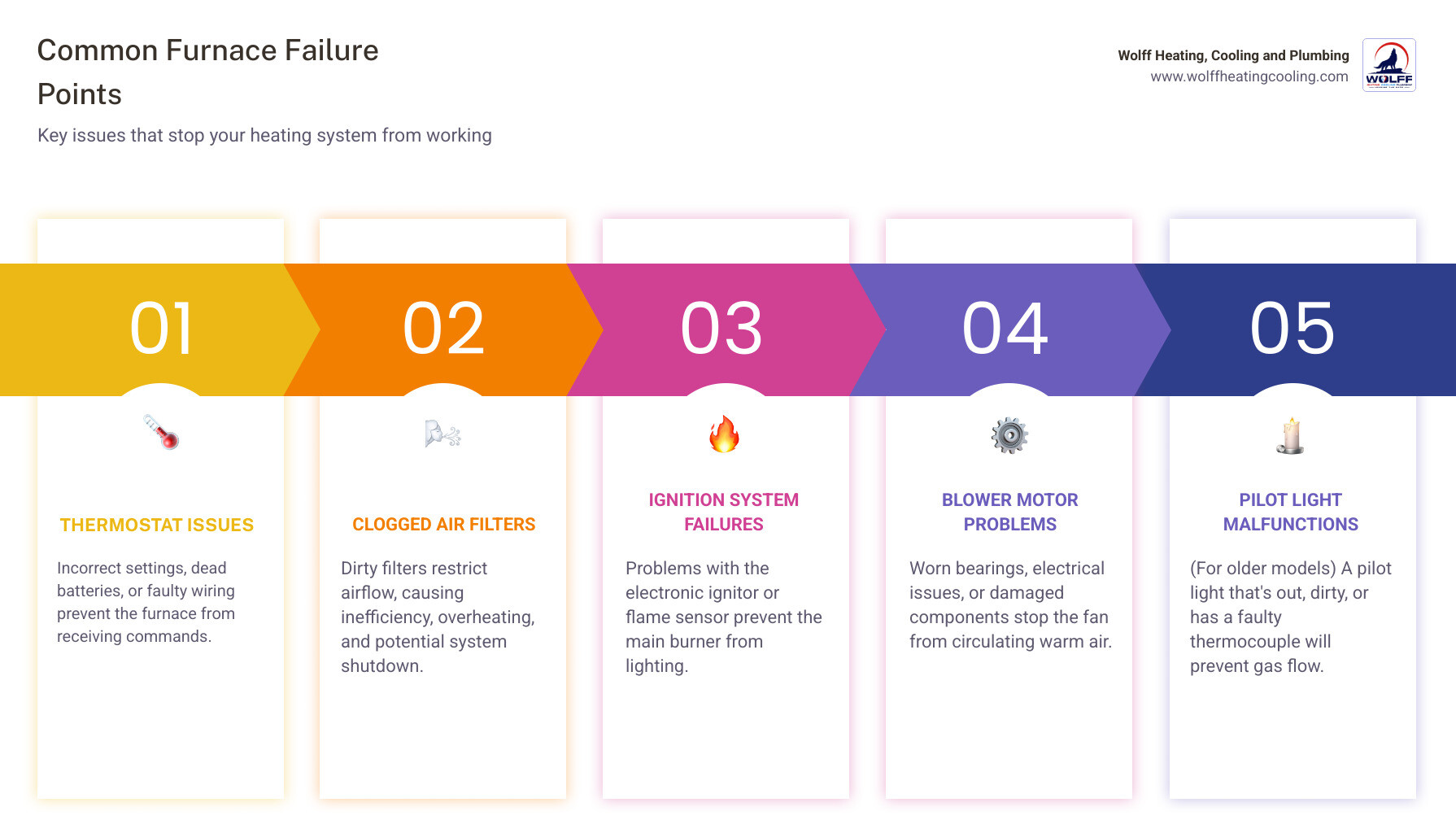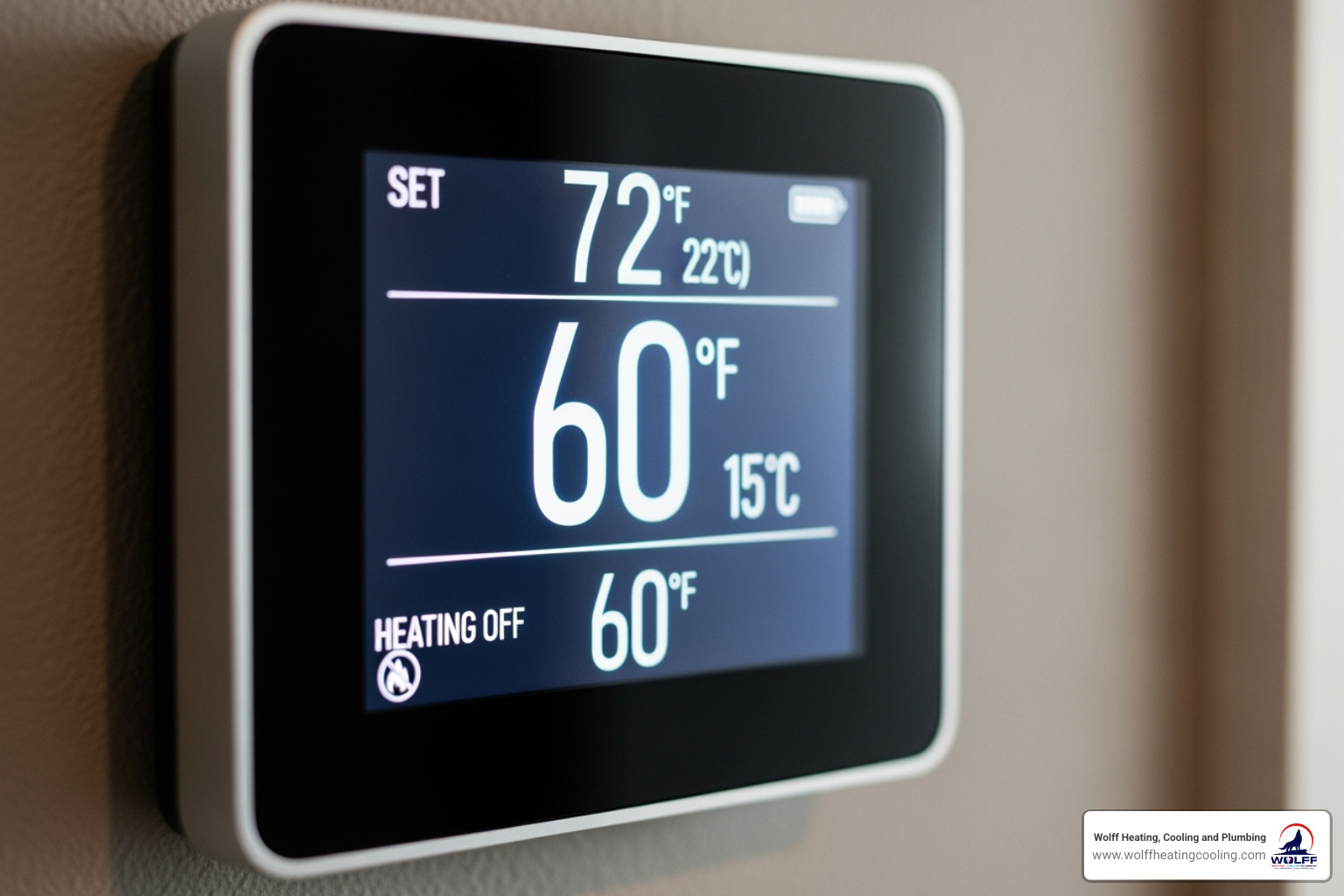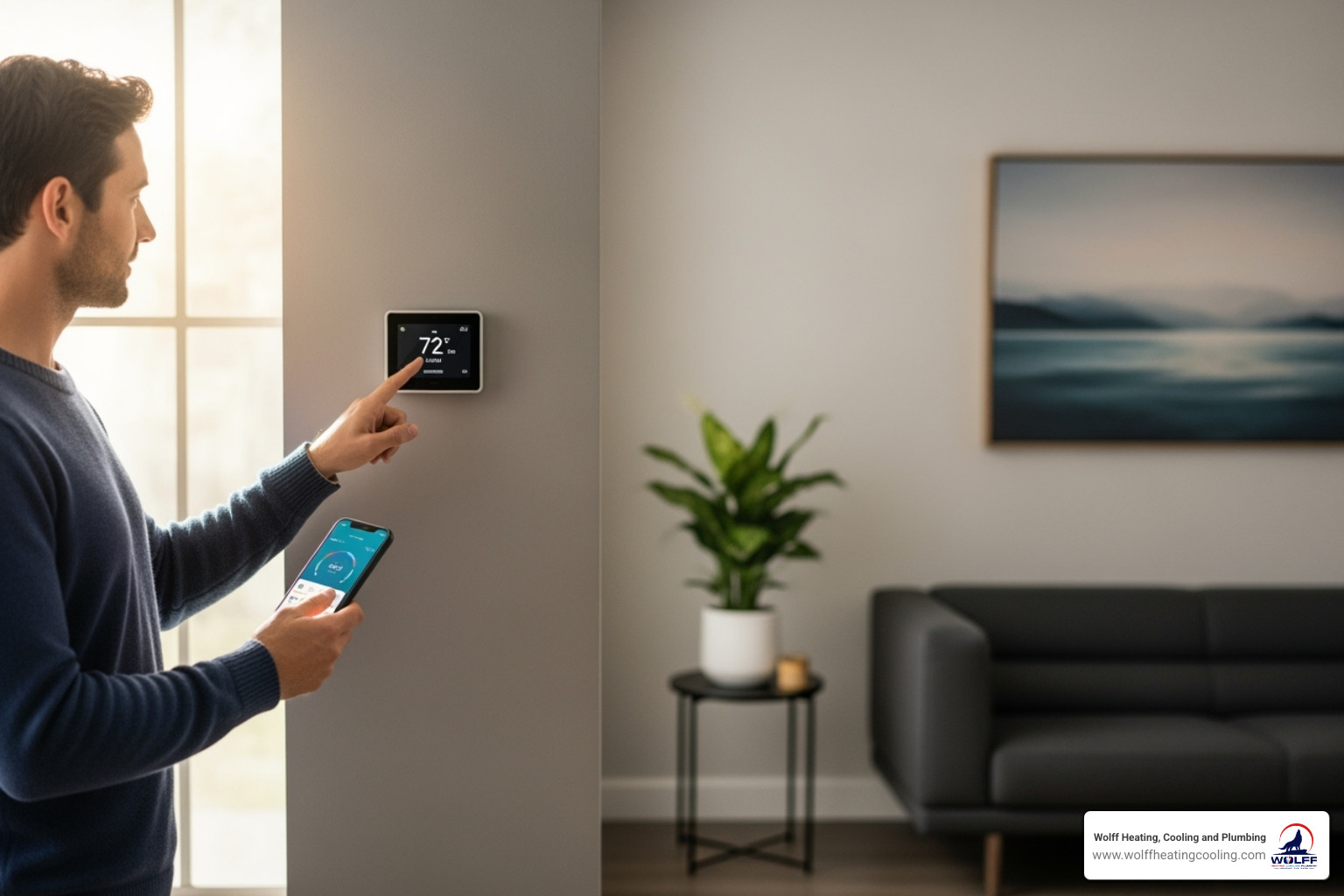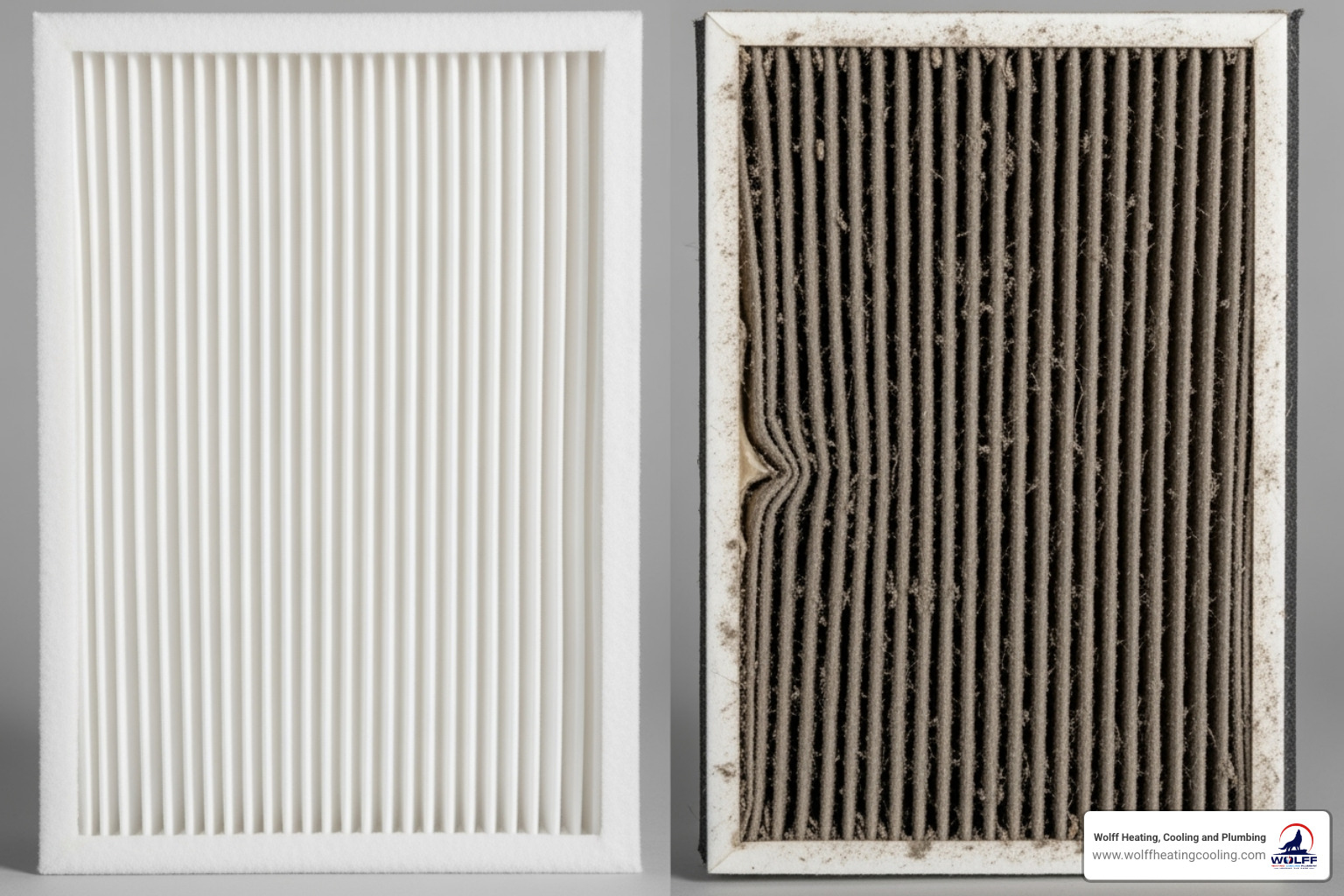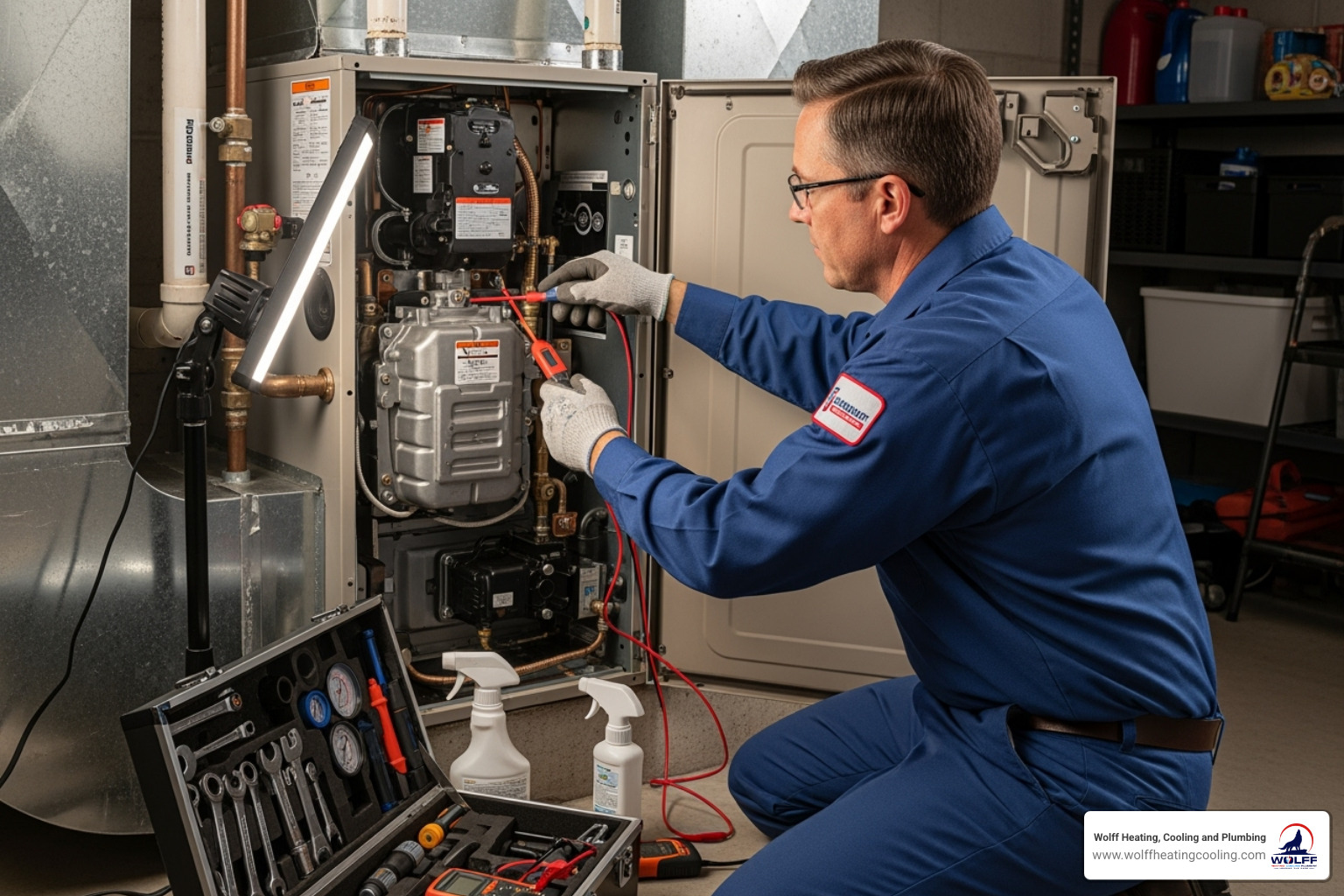Why Albuquerque Furnaces Fail When You Need Them Most
When your furnace not working albuquerque home leaves you in the cold, the panic is real. A silent furnace on a winter night is a major problem. While some issues require professional expertise, many are simple fixes you can handle yourself.
Quick Troubleshooting Checklist:
- Check your thermostat – Ensure it’s set to HEAT, temperature is above room temp, and batteries are fresh
- Verify power supply – Check circuit breaker and furnace power switch
- Inspect air filter – Replace if dirty or clogged
- Look for pilot light – Relight if out (older models only)
- Listen for unusual sounds – Banging, screeching, or rattling signals problems
- Smell for gas – If present, evacuate immediately and call professionals
When to Call Wolff Heating, Cooling and Plumbing:
- Gas smell or carbon monoxide detector alerts
- Furnace won’t start after basic checks
- Strange noises or burning odors
- Frequent cycling on and off
- Uneven heating throughout your home
This guide walks you through the most common reasons furnaces fail in Albuquerque homes. You’ll learn what to check first, when to call for help, and how to prevent future breakdowns.
With over 25 years serving the Albuquerque area, Wolff Heating, Cooling and Plumbing has compiled this troubleshooting guide to help you get warm again as quickly and safely as possible.
Common Signs Your Albuquerque Furnace Needs Repair
Your furnace rarely quits without warning. Paying attention to early warning signs can help you avoid a breakdown on the coldest night of the year.
Beyond a cold house, here are other telltale signs that your heating system needs attention.
Strange noises are a clear cry for help. A healthy furnace should hum quietly. Banging can indicate delayed ignition (a dangerous issue where gas builds up before lighting), screeching often points to a worn fan belt or motor bearing, and rattling usually means a part is loose.
Pay attention to unusual smells. A light burning dust smell is normal at the start of the season. However, a persistent burning odor suggests an electrical problem or overheating. If you ever smell gas, evacuate your home immediately and call for emergency help.
Uneven heating or cold spots throughout your home mean your furnace is struggling. This often points to restricted airflow from a clogged filter or ductwork issues.
Weak airflow from your vents is another red flag. If you feel a gentle breeze instead of a steady flow of warm air, the cause could be anything from a dirty filter to a failing blower motor.
Noticeably rising energy bills without a change in your usage indicate your furnace is working overtime. This inefficiency can be caused by worn parts, dirt buildup, or age.
Finally, watch for frequent cycling. If your furnace turns on and off repeatedly without completing a full heating cycle, it’s “short cycling.” This is hard on the system and often signals a problem with the thermostat, filter, or ignition.
Catching these warning signs early can prevent a complete breakdown. For more details, see these Signs You Need Furnace Repair that furnace not working Albuquerque homeowners commonly experience.
DIY Furnace Troubleshooting: What to Check Before You Call
Before calling about your furnace not working Albuquerque situation, a few simple checks might solve the problem and save you time and money. Many furnace issues have surprisingly simple solutions.
Here’s your quick DIY checklist:
- Check your thermostat settings and batteries
- Ensure the furnace power switch is on
- Inspect your home’s circuit breaker for tripped breakers
- Verify the gas supply valve is open (for gas furnaces)
- Check and replace your air filter if it’s dirty
- For older gas furnaces, check if the pilot light is lit
Check the Thermostat
Your thermostat is the brain of your heating system. First, confirm it’s set to “HEAT” mode and the temperature is set higher than the current room temperature. Next, check the fan setting. If it’s on “ON” instead of “AUTO,” it will blow air constantly, even when it’s not heated. For digital thermostats, check the batteries; dead batteries are a common culprit. If the screen is blank after replacing batteries, the thermostat itself may be faulty.
Inspect the Power and Fuel Supply
Your furnace needs power and fuel to operate. Go to your circuit breaker panel and find the breaker labeled “Furnace” or “HVAC.” If it’s tripped (in the middle or “OFF” position), flip it completely off, then back to “ON.” Next, locate the power switch on or near your furnace—it often looks like a light switch. Ensure it’s in the “ON” position.
For gas furnaces, find the gas supply valve on the pipe leading to the unit. The handle should be parallel with the pipe, indicating it’s “OPEN.” If you have an older furnace with a pilot light, check if the small blue flame is lit. If it’s out, follow the manufacturer’s instructions to relight it, but do not proceed if you smell gas or feel unsafe.
Examine the Air Filter
A dirty air filter is the most common cause of furnace problems in Albuquerque. When clogged with dust and debris, it restricts airflow, forcing your furnace to work harder. This can cause the system to overheat and trigger a safety switch that shuts it down, leaving you with no heat.
To check, pull the filter out and hold it to a light. If you can’t see light through it, it’s time for a replacement. We recommend checking your filter monthly and replacing it every 1-3 months, or more often if you have pets or allergies. A clean filter is crucial for your system’s performance and efficiency. Find more maintenance tips on our HVAC Resources Albuquerque, NM page.
Why Your Furnace is Not Working in Albuquerque: Common Culprits
You’ve checked the thermostat, filter, and power, but your furnace not working Albuquerque problem continues. At this point, the issue is likely more complex and requires professional diagnosis.
Most Albuquerque homes use gas or electric furnaces, and each has unique potential problems. Understanding these can help you communicate with a technician. See our Common Furnace Repair Needs page for more.
Ignition System or Pilot Light Failure
If your gas furnace won’t light, the ignition system is a likely culprit. Modern furnaces use electronic ignitors, while older ones have a standing pilot light.
- Faulty Ignitors: These components wear out and fail to create the spark needed to light the gas.
- Dirty Flame Sensor: This safety device detects the flame. If it’s covered in soot, it will shut off the gas supply, stopping the furnace.
- Thermocouple Problems (Older Furnaces): This part senses the pilot light’s heat to keep the gas valve open. If it fails, the pilot goes out and the furnace won’t run.
- Delayed Ignition: A loud “boom” at startup means gas is building up before igniting. This is a dangerous condition caused by dirty burners or a slow ignitor.
Blower Motor Problems
The blower motor pushes heated air through your ducts. If it fails, the warm air goes nowhere.
- Worn Bearings: Screeching or grinding sounds often indicate worn bearings, which can cause the motor to seize.
- Damaged Fan Blades: Bent or broken blades can cause rattling and inefficient airflow.
- Electrical Issues: A failed capacitor (which helps the motor start), loose wiring, or a burned-out motor will prevent air from circulating, even if the furnace is creating heat.
A Malfunctioning Thermostat
Beyond basic settings, a thermostat can have deeper issues. Faulty wiring between the thermostat and furnace can disrupt communication, preventing your furnace from receiving commands. Incorrect calibration can also be a problem, causing the thermostat to misread the room’s temperature and fail to call for heat when needed. Smart thermostats can also suffer from software or Wi-Fi connectivity issues.
These complex mechanical and electrical issues require professional diagnostic tools and experience to repair safely and correctly.
When to Call a Professional for Furnace Repair in Albuquerque
While DIY troubleshooting is useful, some situations demand professional expertise. When basic checks fail or safety red flags appear with your furnace not working Albuquerque home, it’s time to call the experts at Wolff Heating, Cooling and Plumbing. Learn more about When to Call for Furnace Repair.
Furnaces involve combustion, electricity, and gas—a combination that requires caution. A seemingly minor issue can hide a serious problem that puts your family at risk.
Safety First: Don’t Risk It
These situations are emergencies. Stop troubleshooting and take immediate action.
- Gas smell: If you smell the rotten egg odor of natural gas, evacuate everyone from the house immediately. Do not use phones or flip light switches. Once outside, call your gas company and 911.
- Electrical buzzing or a burning smell: This could indicate a fire hazard from faulty wiring or a failing motor. Turn off the furnace at the circuit breaker and call us right away.
- Carbon monoxide detector alerts: This is a silent killer. If the alarm sounds, get everyone outside immediately and call 911. Your furnace may have a serious issue like a cracked heat exchanger.
Understanding the Professional Repair Process
When you call us, a certified technician will arrive with modern diagnostic tools to systematically inspect your entire system. After identifying the problem, we explain it clearly and provide an honest estimate before any work begins. Simple repairs like replacing a sensor or capacitor can often be done on the same visit. More complex repairs involving parts like a blower motor may take longer if a part needs to be ordered. We always provide realistic timelines and keep you informed. As authorized PNM contractors, we can also guide you to PNM energy efficiency programs.
Considering Repair vs. Replacement for your furnace not working in Albuquerque
Is it better to repair or replace your furnace? We provide honest advice to help you decide.
- Furnace age: Most furnaces last 15-20 years. If your unit is approaching this age and breaking down, replacement is often the smarter financial choice.
- Repair frequency: If you’re facing constant repair bills, those costs can add up. Investing that money in a new, reliable system may be more cost-effective.
- System efficiency: Modern furnaces can reach 95-98% AFUE (efficiency), compared to 60-70% for older models. The energy savings from a new unit can be substantial.
- Cost calculation: If a major component like the heat exchanger fails, the repair cost can be significant. It’s often wiser to put that money toward a new, warrantied system.
Our goal is to provide the information you need to make the best decision. For more guidance, see our Furnace Installation or Replacement Signs page.
The Importance of Regular Furnace Maintenance
Most furnace not working Albuquerque emergencies are preventable. Regular professional maintenance is your best defense against unexpected breakdowns, saving you money and ensuring your system runs safely and efficiently.
Just like a car needs oil changes, your furnace requires annual attention to perform its best. A well-maintained system is more efficient (lowering energy bills), lasts years longer, and is safer for your family. Our Expert Furnace Maintenance Services are designed to keep your heating system in peak condition.
What’s Included in a Professional Tune-Up?
A comprehensive tune-up is a methodical inspection of every critical component. Our technicians will:
- Clean essential components like the burners, flame sensor, and blower assembly.
- Inspect all electrical connections for wear, corrosion, or loose wires.
- Perform a thorough heat exchanger inspection to check for dangerous cracks.
- Conduct a carbon monoxide test and check for gas line leaks.
- Verify flue and combustion pipes are clear and functioning properly.
- Measure the temperature rise to confirm efficient operation.
Learn more about what’s included in our Furnace Tune-Up service.
How Maintenance Prevents a furnace not working in Albuquerque
Regular maintenance prevents breakdowns by allowing our technicians to spot and fix small problems before they become major emergencies. A worn belt or a failing ignitor can be replaced during a scheduled visit, saving you the stress and cost of an unexpected failure. This proactive approach ensures your furnace runs at optimal performance, reduces repair frequency, and extends the overall lifespan of your system. We recommend scheduling a tune-up each fall to ensure your furnace is ready for winter and to give you peace of mind that your family will stay warm and safe.
Conclusion
When faced with a furnace not working Albuquerque situation, knowing a few troubleshooting steps can help you identify simple fixes. However, it’s just as important to recognize when a problem requires a professional. For any safety concerns like a gas smell or CO detector alert, always prioritize safety and call for help.
The best way to avoid furnace failures is with regular professional maintenance. Annual tune-ups catch small issues before they become expensive emergencies, improve efficiency, and extend the life of your system.
For reliable furnace service in Albuquerque, Rio Rancho, Placitas, Corrales, and surrounding areas, trust the team at Wolff Heating, Cooling, and Plumbing. With over 25 years of experience, we provide superior work and honest estimates to fix problems quickly and safely.
Whether you need an emergency repair or want to schedule preventative maintenance, we’re here to help. Schedule your heating service today and let us ensure your home stays warm and comfortable all winter long.

